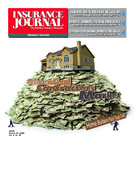This recurring feature examines insurance coverage decisions in the Midwest’s appellate courts, as compiled by the New York-based law firm of Goldberg Segalla LLC and edited by insurance lawyer Kevin T. Merriman (kmerriman@goldbergsegalla.com).
Hemocleanse Inc. v. Philadelphia Indemnity Insurance Company
(Indiana Appeals Court, July 26, 2005)
—Ruling: Arbitration clause enforced.
Insured brought suit against insurer for breach of contract and breach of covenant of good faith and fair dealing after insurer denied coverage under directors and officers liability policy. The complaint was ultimately dismissed on forums non-conveniens. The insurer moved to stay the complaint and compel arbitration of the insured’s claims. The trial court entered its order compelling the insured to arbitrate its breach of contract claim, denying the insurer’s motion to compel arbitration of the claim for breach of the covenant of good faith and fair dealing, and ordering that the latter claim be stayed pending the results of the arbitration. The Court of Appeals affirmed the trial court’s ruling, finding that the insured’s request for a defense constituted a “coverage dispute” which was subject to the binding arbitration provision of the policy. Furthermore, the court held that the insurer did not waive its right to arbitrate by failing to defend under a reservation of rights or to seek a declaratory judgment.
Miller v. O’Brien
(Missouri Appeals Court, Aug. 2, 2005)
—Ruling: Driver of non-owned auto not “insured” under employer’s policy.
Pedestrian sued driver and driver’s employer after he was injured in accident. Pedestrian obtained judgment against driver and filed an equitable garnishment action against employer’s insurer. On motion for summary judgment, trial court found driver was an “insured” under the employer’s business owner’s liability insurance policy. The Court of Appeals reversed, finding that the driver did not fall within the parameters of “who is an insured” as set forth in the “Hired Auto and Non-Owned Auto Liability” endorsement since he was not a named insured, a partner or executive officer of a named insured, or a person using a “hired auto” with the insured’s permission. Moreover, as the owner of the “non-owned auto” involved in the accident, the endorsement specifically excluded the driver from being considered an insured.
American Family Insurance Group v. Kiess
(Minnesota Supreme Court, June 16, 2005)
—Ruling: Interest accrues from date insured files petition for arbitration
Auto insurer filed a motion to vacate arbitration award of no-fault benefits, including statutory interest penalty, in excess of jurisdictional limit. The statute in question expressly provides that benefits are overdue 30 days after an insurer has received “reasonable proof of the fact and amount of loss realized.” The insured, however, did not send his medical bills to the insurer after his no-fault benefits had been denied, arguing that it would have been futile to do so. He asserted that the court should charge the insurer with constructive notice of his loss. The court rejected the insured’s argument and held, as a matter of first impression, that no-fault benefits became overdue, and interest began to accrue, thirty days after insured filed petition for arbitration concerning surgery more than four years earlier, not thirty days after the surgery.
Farmers Insurance Company Inc., et al. v. Southwestern Bell Telephone Company
(Kansas Supreme Court, June 10, 2005)
—Ruling: Self-insurer not required to provide UM benefits to Occupants of its motor vehicles.
Auto accident victim and his personal auto insurer brought action against self-insured employer based on liability for uninsured motorist (UM) benefits. The federal court certified the following question: is a self-insurer required to provide UM benefits to the occupants of its motor vehicles? The Kansas Supreme Court held that self-insurer is not required to provide UM/UIM benefits to the occupants of its motor vehicles. The plaintiffs argued that Kansas courts have equated self-insured retentions with other insurance and concluded that self-insurers must be treated the same as insurers. The court, in reaching its decision, noted that the Kansas legislature has separately defined insurers and self-insurers.
Was this article valuable?
Here are more articles you may enjoy.


 The $3 Trillion AI Data Center Build-Out Becomes All-Consuming for Debt Markets
The $3 Trillion AI Data Center Build-Out Becomes All-Consuming for Debt Markets  Trump’s Repeal of Climate Rule Opens a ‘New Front’ for Litigation
Trump’s Repeal of Climate Rule Opens a ‘New Front’ for Litigation  ‘Structural Shift’ Occurring in California Surplus Lines
‘Structural Shift’ Occurring in California Surplus Lines  Insurify Starts App With ChatGPT to Allow Consumers to Shop for Insurance
Insurify Starts App With ChatGPT to Allow Consumers to Shop for Insurance 


